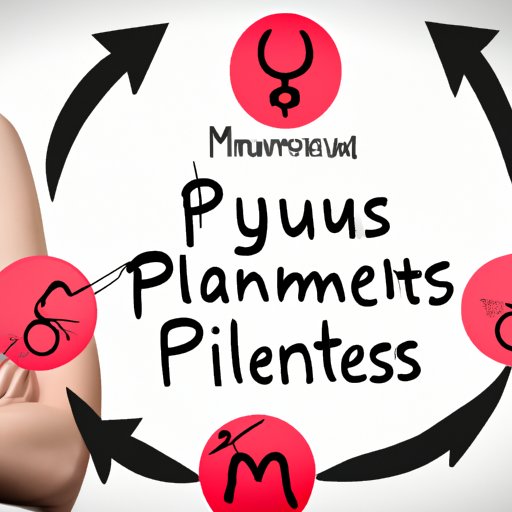
I. Introduction
PMS symptoms are a significant issue for many women, impacting their physical and mental health. It is important to understand when PMS symptoms start and how to manage them to help women live the most productive and comfortable lives they can. This article explores the onset of PMS symptoms, offering practical tips and advice for those who suffer from them.
II. The Female Body: Understanding PMS Symptoms and the Onset of Menstrual Cycle
To understand when PMS symptoms occur, it is essential to understand the menstrual cycle and the hormones involved. Menstruation is the body’s way of preparing for pregnancy. The menstrual cycle comprises four distinct phases: the follicular phase, ovulation, the luteal phase, and menstruation.
Most women experience PMS symptoms during the luteal phase, which begins after ovulation and ends with the start of menstruation. Hormonal changes during this phase set the stage for PMS symptoms.
III. Navigating the Hormonal Changes: Pre-Menstrual Signs and Symptoms to Watch Out For
PMS can present in many forms, with symptoms varying from one woman to another. Common physical symptoms include cramping, bloating, breast tenderness, fatigue, and headaches. Meanwhile, common psychological symptoms include mood swings, irritability, depression, and anxiety.
IV. From Cramps to Irritability: How Early Can PMS Symptoms Show Up?
PMS symptoms can occur at any time during the luteal phase. However, they usually show up a few days before the start of menstruation. Women who are more sensitive to hormonal changes may experience PMS symptoms earlier than others.
Studies show that PMS symptoms can begin as early as 1-2 weeks before menstruation. However, most women typically experience symptoms 7-10 days before the start of their period. PMS symptoms usually disappear within the first few days of menstruation.
V. Are You Experiencing PMS or Something Else? A Guide to Recognizing PMS Symptoms
It can be challenging to differentiate between PMS and other conditions, especially since PMS symptoms can be similar to those of other conditions. Endometriosis, thyroid problems, and depression can all mimic PMS symptoms and cause confusion.
However, some symptoms are specific to PMS, including menstrual cramps, bloating, and headaches. Additionally, the timing of the symptoms’ onset can help distinguish PMS from other conditions. If you are unsure, it’s essential to talk to a doctor to rule out other conditions.
VI. PMS and Mental Health: The Emotional Changes Women Experience Before Their Period
PMS can impact mental health, as changes in hormonal levels can affect mood and behavior. It’s common for women to experience emotional changes before their period, including mood swings, irritability, depression, and anxiety.
Dealing with PMS-related mental health issues can be challenging, but there are ways to manage them. Engaging in self-care activities such as meditating, exercise, and practicing mindfulness can help alleviate symptoms.
VII. Managing PMS Symptoms: Tips and Tricks for Coping with the Onset of Menstruation
There are several strategies for managing PMS symptoms, including dietary changes, medical interventions, lifestyle changes, and alternative therapies. Diet changes that may help include reducing caffeine and alcohol intake, avoiding salty foods, and increasing water intake. Medical treatments may involve the use of pain medication, hormonal contraceptives, and antidepressants to alleviate symptoms.
Additionally, lifestyle changes may help, such as regular exercise, stress management techniques, and getting enough sleep. Alternative therapies such as acupuncture, herbal remedies, and aromatherapy can also help alleviate symptoms.
VIII. Conclusion
In conclusion, understanding when PMS symptoms start and how to manage them is essential for women’s health and wellbeing. By recognizing PMS symptoms, women can take appropriate steps to alleviate them and reduce their impact on daily life. Whether through self-care activities, medical interventions, or alternative therapies, there are solutions available.
Remember, if you are experiencing severe PMS symptoms, seek medical advice. You don’t have to suffer and struggle on your own. With proper guidance, you can learn to live a happy and healthy life, even with PMS.




